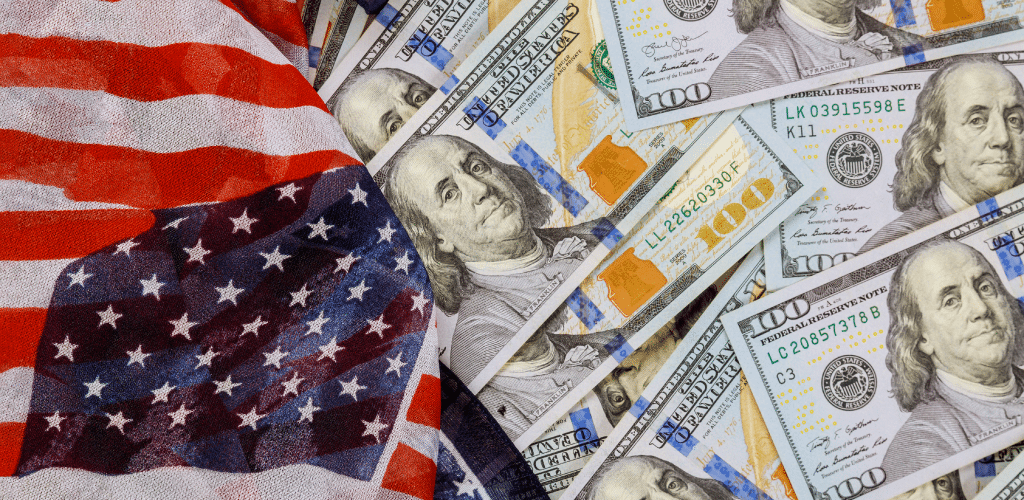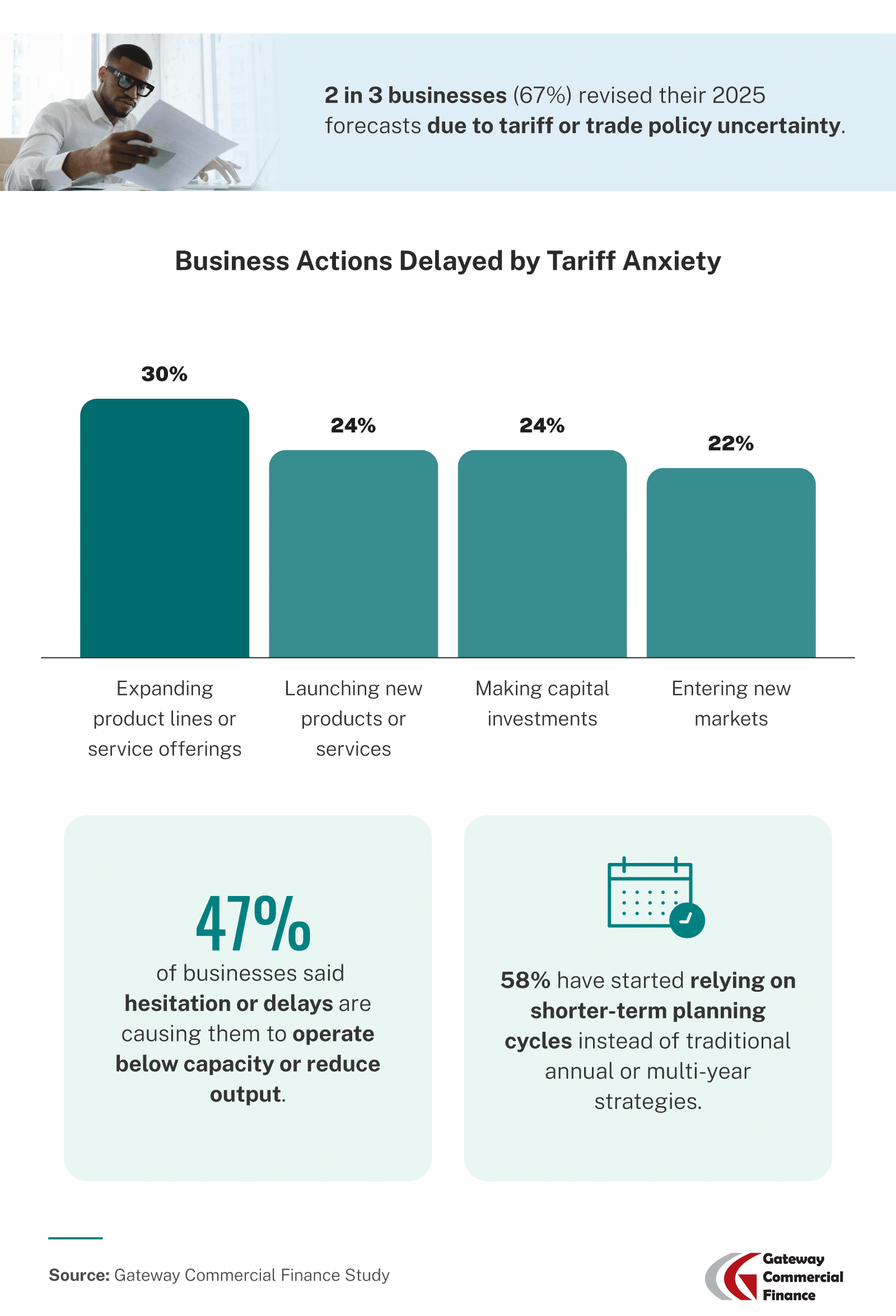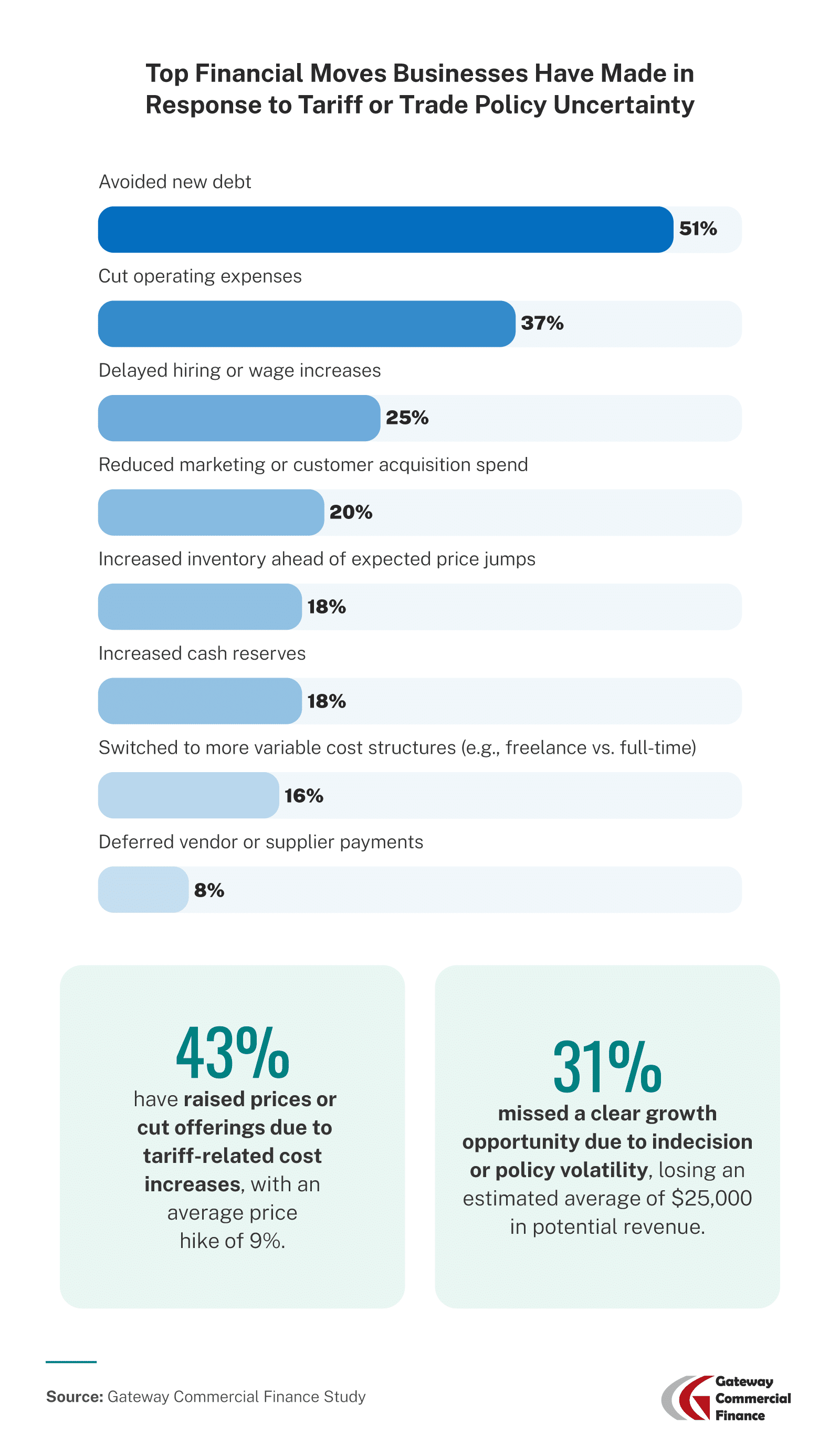
As uncertainty around U.S. tariff policy continues into 2025, small and mid-sized business owners are playing defense. To better understand the impact, Gateway Commercial Finance surveyed 250 business owners across sectors to learn how tariff-related hesitation is affecting growth, pricing, investment, and competitiveness. The results reveal widespread delays, rising costs, and a cautious turn toward short-term planning. All signs point to a disruption in business confidence.
Key Takeaways
- 2 in 3 businesses have revised their 2025 forecast (projected estimates of future revenue, expenses, and growth) due to tariff or trade policy uncertainty.
- Over 2 in 5 businesses (43%) raised prices or cut offerings due to tariff-related cost pressures, with an average price increase of 9%.
- Nearly 1 in 3 businesses (31%) missed a clear growth opportunity due to indecision or policy volatility, resulting in an estimated average loss of $25,000.
- 2 in 5 businesses (40%) have started using AI tools like ChatGPT to simulate or plan for the business impact of tariff or trade policy changes.
- More than 2 in 5 businesses (44%) say current U.S. trade policy has made it harder for them to compete with foreign or larger competitors.
Strategic Planning Disrupted by Uncertainty
Widespread economic uncertainty is pushing small businesses to play it safe, with key sectors feeling the strain more than others.

Two-thirds of business owners said they revised their 2025 forecasts due to ongoing instability around U.S. tariffs and trade policy. This growing unease is slowing decision-making across the board. Nearly half (47%) reported operating below capacity or reducing output as they hesitate to commit to long-term strategies.
Shorter planning cycles are now the norm for many. Close to 3 in 5 respondents (58%) are shifting away from traditional multi-year strategies in favor of short-term planning. More than half (55%) pointed to geopolitical tensions, trade wars, and foreign elections as major reasons for their reluctance to plan ahead.
This uncertainty is especially hitting retail, tech, and arts/entertainment businesses, which were the most likely to revise their forecasts. Finance/banking and healthcare firms also reported feeling the ripple effects of tariff-related disruption, rounding out the top 5 most impacted sectors.
Confidence has taken a hit across the board. Nearly 3 in 5 business owners (59%) said they don’t feel comfortable making long-term decisions in today’s economic climate. To compensate, 40% have started using AI tools like ChatGPT to model different trade scenarios and prepare for the potential impact of shifting policy.
How Businesses Are Adapting to Global Trade Instability
From reshoring to supplier diversification, companies are trying to take back control in uncertain conditions.

Many companies are adapting by rethinking their operations in response to global trade instability. Over a quarter (28%) have explored new or alternate business models, while nearly 1 in 5 have shifted to domestic suppliers. Others are reducing international sales (18%) or diversifying their supplier base (13%) to spread out the risk. Smaller but significant changes include reshoring production (12%), sourcing from lower-tariff countries (11%), and moving manufacturing closer to U.S. markets (9%).
Policy volatility and tariff-related costs are also reshaping business strategies. More than 2 in 5 businesses (43%) have raised prices or trimmed their offerings to cope with these pressures, with an average increase of 9%. Thirty-two percent have postponed or canceled a product launch over concerns about rising input costs. Nearly the same share (31%) missed a clear growth opportunity, losing an estimated average of $25,000, due to delays or uncertainty around trade policy.
Access to capital is another casualty of ongoing uncertainty. More than 2 in 5 owners (43%) have avoided applying for business loans, grants, or lines of credit this year, unsure of the return. Just over 1 in 4 (28%) have turned to short-term credit or bridge financing to keep operations steady. And with 44% saying current U.S. trade policy makes it harder to compete with foreign or larger firms, these shifts reflect a broader push for stability and control in a volatile global market.
Conclusion: Hesitation Has a Price
For small and mid-sized businesses, waiting out uncertainty is proving costly. Delayed investments, missed growth opportunities, and rising input costs are eroding confidence and shrinking the margin for error. With more owners turning to short-term fixes and alternative planning tools, it’s clear that economic unpredictability is an inconvenience and a growth barrier. Until trade policy stabilizes, businesses will need to stay agile, make calculated moves, and seek out reliable capital solutions to protect their momentum.
Methodology
We surveyed 250 small business owners to explore how uncertainty around U.S. tariff policy is freezing small business growth. The data was collected in June 2025.
About Gateway Commercial Finance
Gateway Commercial Finance helps small to mid-sized B2B companies overcome cash flow hurdles with fast, flexible funding solutions like invoice factoring. Whether you’re managing payroll, supplier costs, or recovering from financial setbacks, Gateway Commercial Finance offers dependable capital when you need it most.
Fair Use Statement
If you’d like to share these insights, you’re welcome to use this content for noncommercial purposes. Just make sure to include a link back to Gateway Commercial Finance and give proper credit.
